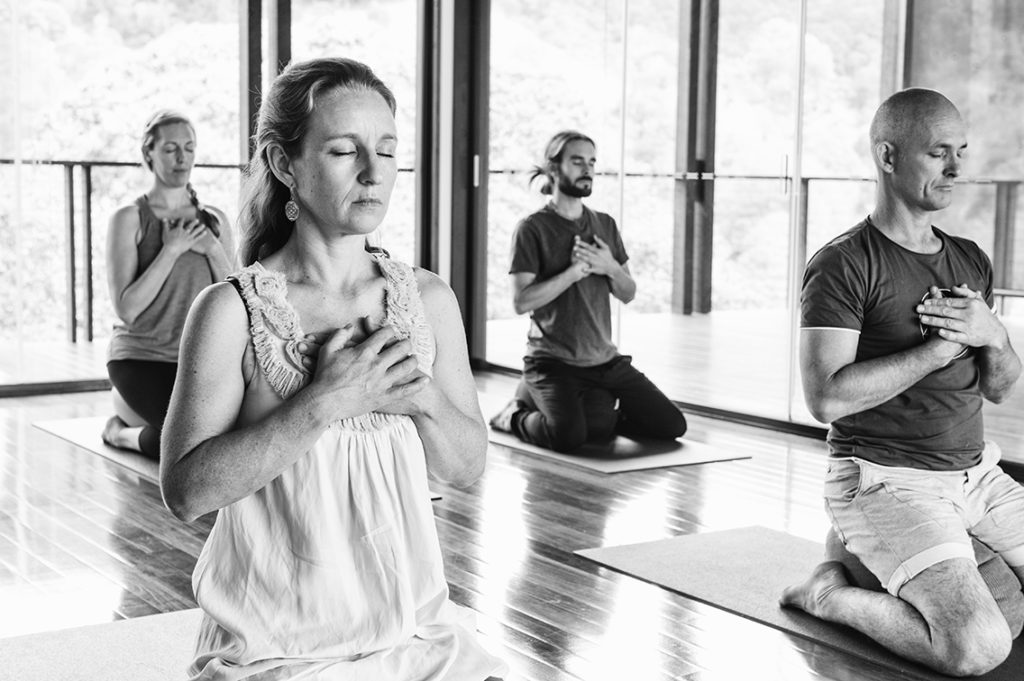Join Celia Roberts, Leanne Davis, Samantha-Lindsay German, & Craig Smith this January 2019

20hr Higher-Level Learning Certificate in Yoga Therapy for Mental Health
Saturday 19 January & Sunday 20 January
Book Before January 11 $399
In a world where we are constantly surrounded by a society that demands time watching and perpetual rushing, quite often there is a calling within, an innate need to listen to the body that ask us to simply stop. This notion is becoming ever present within the health industry as our society begins to recognise the detrimental effects of ever-present technology has on our connections with others and our true self. Moreover, there is slowly becoming an overt awareness as to the imperative nature and need for balance, restoration, and compassionate connection to the body, mind, and breath.
There is now a need for those within any element of the health industry to reintegrate knowledge and understanding of the great wisdom instilled within the intuit body; a need for health professionals to come to understand how the body and mind work together, as well as why and how specific practices can alleviate the detrimental effects of a disconnected and apprehensive lifestyle.
Let Celia Roberts, Leanne Davis, Samantha-Lindsay German, & Craig Smith be your guides in understanding and applying state-of-the-art science and traditional wisdom to practices that assist the self and other in releasing and overcoming states of stress, anxiety, insomnia, and depression.
Yoga has the word out on mental health, with evidenced based practices that support a return to health. It is a boon to your brain…
Saturday 19 January 2019 9:30am – 1:00pm
Hosted by Leanne Davis, President of Yoga Australia
Traditional Yoga Therapy for Mental Health
This is an immersive experience of true yogic wisdom that encapsulates what it means to be in a state of mental health and holistic well-being, that is the state of yoga. This session is specifically aimed at understanding and cultivating states of peace, equilibrium, and evenness of mind through the philosophy of practice and the eastern yogic perspective.
We will be exploring:
- What yogic states of mind are (exploring Rajas, Tamas, and Sattva).
- Why yoga therapy is not about treating a condition.
- Why assessment of state is vital in underpinning application of yoga therapy tools.
- How one assesses the activity of the mind.
- How we establish what is taking a person away from the state of yoga and clarity.
- How we know what tools to use in accordance with an individual’s needs and wants.
- Overall assessment, selection, sequencing, and application, of yoga therapy tools.
Saturday 19 January 2019 1:45pm – 4:45pm
Hosted by Celia Roberts BSc, Senior Yoga Teacher and Yoga Therapist
Clinical Yoga Therapy for Mental Health including Anxiety, Addictions and Depression
This is an immersive experience of state-of-the-art science and practices for overcoming suffering and moving towards physical and mental liberation through the art of clinical yoga therapy. Celia’s afternoon session is an introduction to the theory and research behind the neuroscientific link between meditation, yoga, and natural restorative remedies to the body’s reactive states. Clinical yoga therapy for mental health offers practical wisdom for overcoming the ailments of anxiety, addiction, depression, and other mental and physical illnesses.
We will be exploring:
- How stress, anxiety, addiction, depression, and the like are in the body not just the brain, as well as how adverse mental health effects the microbiome and vice versa
- How and why the size of the amygdala and its connectivity to the rest of the brain is linked to high levels of prolonged anxiety.
- How and why inflammation is connected to mental health.
- The neuroscientific foundation of how meditation positively effects in the body and the brain including the biological and karmic fate in our genes
- How and why yoga and mindfulness meditation are proven to help.
- How and why traditional yoga has always explored neuroscience with reference to the sutras and philosophy
- How and why some dietary changes can often show greater improvement than psychological treatment, while still acknowledging the imperative nature of utilising the two together in a successful manner.
- Practical application of breathing for heart rate variability thus excellent nervous system control (vagal tone), as well as how to invite yourself to explore a pose with mindfulness of the internal perception of pleasant or painful sensation.
- Overall assessment, selection, sequencing, and application, of yoga therapy tools
Sunday 20 January 2019 9:30am – 1:00pm
Hosted by Craig Smith
Yoga Therapy for Posture, Breathing, Mental Heath
This is an immersive experience of understanding the innate energetic connection between body, mind, and breath our breath is the manipulator of subtle energy flow, it has the power to cultivate qualities of calmness, peace, lightness, comfort as well as attentiveness. This brings simplicity to complexities, and connects our bodies and minds, allowing ultimately for integrated wellbeing and the space within for energy to flow.
This session is aimed at understanding how and why aligning state-of-the-art science and the Yoga Sutra’s allows us to cultivate well-being within ourselves and others. This session aspires to enhance your knowledge of pranayama and the yoga postures that allow access to the inner most being – the true self – and thus access to mental health.
We will be exploring:
- Understanding how the body, mind, breath complex relieves stress related conditions
- Using the classical pranayama practices to influence our psychology and physiology in relation to stress
- Looking at intelligently placed steps for the practices according to the yoga sutras
- Overall assessment, selection, sequencing, and application, of yoga therapy tools.
Sunday 20 January 2019 1:45pm – 4:45pm
Hosted by Samantha Lindsay German
Kundalini Yoga Medical Model for Addictions
This is an immersive experience of understanding the connection between yogic physiology and metaphysical anatomy and the western biomedical perspective of the body-mind connection. This session is aimed at understanding addiction as a way in which we view and process life -not as a specific attraction to a negative substance. More so this session is aimed at seeing addiction from a different perspective in order to align well-being in accordance to sutra 2.16 and a future free from suffering.
We will be exploring:
- How and why Kundalini yoga is proven to work for addictions and building resilience in the brain
- How to elicit the relaxation response for wise decision making and critical mental processing
- How to strengthen the nervous system – parasympathetic and sympathetic
- How to challenge and reprogram the nervous system through yoga
- Understand the Medical Model of kundalini yoga meditation techniques by David Shannahoff-Khalsa and the protocols for use.
- Learn to practice and teach the 40-day kundalini yoga program for healing addictions and incorporate everyday short meditations for healing addictions into practice
- How to eliminate addictions through mindfulness – to reduce experience of craving and conscious control of cravings and to strengthen pathways increasing GABA levels to reduce addictive behaviours and cravings.
We welcome you to join four conversant yogic teachers and therapists as they share their adept practice wisdom with you and bring you a weekend dedicated to improving your holistic well-being through the breath.
At the end of this 13-hour face-to-face weekend you will be provided with materials for reading as well as a BIYOME certificate of completion. This course is intended to provide you will a substantial knowledge base in yoga therapy – this however does not qualify you as a yoga therapist. We use the term “therapy” as a reference to varied methodologies that enable well-being.
Disclaimer and Waiver:
This weekend is a registered 20hr Yoga Australia training weekend and attracts CPD points for yoga teachers, therapists, allied health professionals. Interested members of the public who are engaged in the practices of yoga and meditation may attend for interest, education and higher-level learning.
These short courses do not qualify you to become a yoga teacher or therapist. By registering and attending this course you agree to our terms and conditions and our waiver as located here. For more information on how to become fully qualified, please check our teacher training and yoga therapy training for more details.



